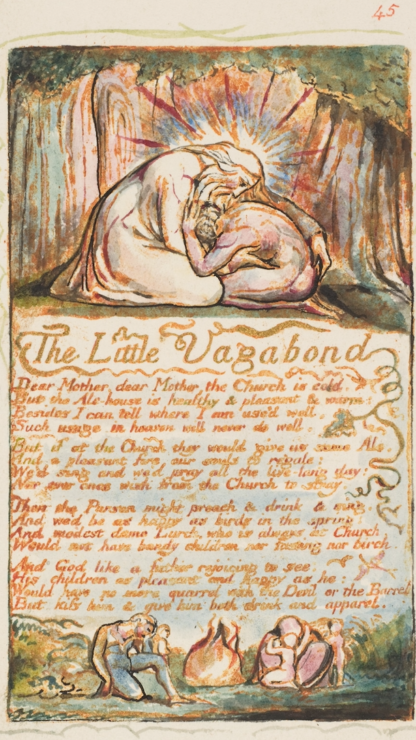< Return to William Blake Poems
The Little Vagabond
Dear mother, dear mother, the Church is cold;
But the Alehouse is healthy, and pleasant, and warm.
Besides, I can tell where I am used well;
Such usage in heaven will never do well.
But, if at the Church they would give us some ale,
And a pleasant fire our souls to regale,
We’d sing and we’d pray all the livelong day,
Nor ever once wish from the Church to stray.
Then the Parson might preach, and drink, and sing,
And we’d be as happy as birds in the spring;
And modest Dame Lurch, who is always at church,
Would not have bandy children, nor fasting, nor birch.
And God, like a father, rejoicing to see
His children as pleasant and happy as He,
Would have no more quarrel with the Devil or the barrel,
But kiss him, and give him both drink and apparel.
—William Blake
Original Illustration of The Little Vagabond by William Blake

Watch The Little Vagabond by William Blake Videos
Musical Interpretations of “The Little Vagabond”
About William Blake
William Blake (1757—1827) was a poet and engraver. He went to school long enough to learn to read and write, leaving at age 10. Beyond that, he was homeschooled by his mother, Catherine. Blake was inspired as a child by artists such as Raphael, Maarten van Heemskerck, Michelangelo, and Albrecht Dürer, whose work he was introduced to through books and prints. At the age of 10 his parents enrolled him in the drawing school at the Strand. At that time, Blake, who enjoyed reading, started to write his own poetry.
Blake was apprenticed to an engraver, and completed his apprenticeship at 21. James Basier drew in the older style, line-engraving (that looks similar to lineart) as opposed to the more popular painterly methods. Blake was sent to Westminster Abbey to sketch, and was inspired artistically by it; additionally, he experienced visions there. In 1779, Blake joined the Royal Academy, a school of art, where he met friends such as John Flaxman, Thomas Stothard, and George Cumberland, who shared his radical views. Blake ended up, perhaps accidentally, in a riot on Newgate Prison (the Gordon Riots).
Blake married Catherine Boucher, who he taught to read and write, as well as training her as an engraver. She became a partner in his work.
Blake published his first volume of poems, Poetical Sketches around 1783. He and his former fellow apprentice James Parker opened a printshop, and worked with Joseph Johnson (a radical publisher who worked with many dissidents such as John Henry Fuseli, Richard Price, Joseph Priestly, Mary Wollstonecraft, and Thomas Paine).
Blake used relief etching (or illuminated printing) to illustrate most of his writing. Instead of the usual intaglio style, where the plate is covered with an acid-resistant coating such as wax, and the lines scratched through the coating, so that the lines to be printed are cut into the plates; Blake would paint his pictures onto the plate in the acid-resistant medium and etch the rest of the plate, so that the parts to be printed onto paper would stand up in relief. He would then hand-color the finished prints with watercolors. (For this reason, there are many different colored versions of his various poems). This creates the “loose” effect of his hand on the page, present in his illuminated poems. For his commissions, however, he would work in intaglio.
In the books Songs of Innocence and Songs of Experience Blake wrote lyric poetry that also served as scathing social commentary. He wrote some poems, such as The French Revolution that were never published.
In his poem America Blake explored the idea of revolutions, and in The Marriage of Heaven and Hell he satirizes both the state and the church. In 1790 he moved to Lambeth.
Blake created his connected mythology in a collection of illuminated poems known as his prophetic works, partially based on the events of his day, in which he continued to explore his philosophical and ethical ideas. Blake continued to make money through commissions from patrons, though sometimes he had issue with their lack of imagination. Around this time, he started his epic work, Jerusalem.
In August 1803, Blake and a soldier named John Scofield got into a fight, and the soldier accused him not only of assault, but of speaking seditious words against the king. Though Blake went to trial, it seemed clear that the evidence was invented, and Blake was acquitted.
Blake was interested in illustrating the Canterbury Tales but after bringing the idea to a publisher, the publisher chose another engraver for the piece, as Blake was known as too eccentric to be marketable. Instead, Blake set up an exhibition to promote his version. With that, he published the “Descriptive Catalogue” of his pieces, which included an analysis that became known as a classic of Chaucer criticism. But the exhibition did poorly, and sold nothing.
Blake began to illustrate The Book of Job, and was given a commission to illustrate Dante’s Divine Comedy, a project he did not finish before his death; but the few watercolors he created for the project received praise. He was still working on that project the day he died; he stopped working on it only to complete a portrait of his wife (with the words “Stay Kate! Keep just as you are—I will draw your portrait—for you have ever been an angel to me.”) After that, he sang hymns, and with his last words being that he would be with his wife always, he died. As for Kate, on the day of her death, a decade later, she called out to him “as if he were only in the next room, to say she was coming to him, and it would not be long now.” (more)
I hope you enjoyed The Little Vagabond by William Blake!
< Return to William Blake Poems
BUY ‘HOW TO WRITE A FORM POEM’ NOW!
